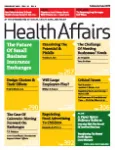| Titre : | Beyond books: Public libraries as partners for population health (2016) |
| Auteurs : | A. U. MORGAN ; R. DUPUIS ; B. D’ALONZO ; A. JOHNSON ; A. GRAVES ; K. L. BROOKS ; A. MCCLINTOCK ; H. KLUSARITZ ; H. BOGNER ; J. A. LONG ; D. GRANDE ; C. C. CANNUSCIO |
| Type de document : | Article : Périodique |
| Dans : | Health Affairs (Vol.35, n°11, November 2016) |
| Article en page(s) : | 2030-2036 |
| Langues: | Anglais |
| Discipline : | SAN (Santé publique / Public health) |
| Mots-clés : |
Thésaurus géographique ETATS-UNISThésaurus mots-clés SANS ABRI ; PSYCHOPATHOLOGIE ; SANTE PUBLIQUE ; ACTION COMMUNAUTAIRE ; PROGRAMME ; ETUDE QUALITATIVE ; PAUVRETE ; ADDICTION ; PREVENTION ; IMMIGRE |
| Mots-clés: | bibliothèque |
| Résumé : |
ENGLISH:
Public libraries are not usually included in discussions about improving population health. They are, however, well positioned to be partners in building a culture of health through programming that addresses the social determinants of health. The Healthy Library Initiative, a partnership between the University of Pennsylvania and the Free Library of Philadelphia (the public library system that serves the city), has undertaken such efforts in Philadelphia. In this article we report findings from an assessment of how ten highly subscribed programs address the social determinants of health, as well as results of interviews with community residents and library staff. Of the 5.8 million in-person Free Library visits in 2015, 500,000 included attendance at specialized programs that addressed multiple health determinants, such as housing and literacy. Library staff provided intensive support to vulnerable populations including homeless people, people with mental illness and substance use, recent immigrants, and children and families suffering from trauma. We found that public libraries are trusted institutions that have broad population reach and untapped potential to improve population health. FRANÇAIS : Lorsqu'il s'agit d'optimiser les dispositifs de prévention à l'attention des populations, il est rarement fait mention des bibliothèques. Or celles-ci peuvent légitimement apparaître comme des partenaires toutes désignées pour construire une culture de la santé. C'est le pari réussi de la ville de Philadelphie, à travers un partenariat entre l'université de Pennsylvanie et la Free Library of Philadelphia. Parmi les 5,8 millions de visites enregistrées par la Free Library of Philadelphia, 500 000 visites concernaient la participation à des programmes spécifiques abordant plusieurs déterminants de santé, comme l'hébergement et l'alphabétisation. Dans ce contexte, les personnels de la bibliothèque fournissaient un soutien privilégié aux personnes en situation de vulnérabilité dont les personnes sans abri, les usagers de drogues, les personnes atteintes de troubles psychiatriques, les réfugiés, ou encore les enfants et familles exposés à un traumatisme. [Actualités des addictions, 18/11/2016] |
| Domaine : | Plusieurs produits / Several products |
| Refs biblio. : | 35 |
| Affiliation : | Center for Public Health Initiatives ; Department of Family Medicine and Community Health at the Perelman School of Medicine, University of Pennsylvania, USA |
 Accueil
Accueil



